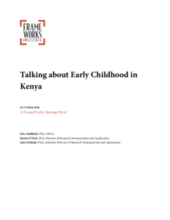Displaying 181 - 190 of 490
This volume examines typical and atypical development from birth to the preschool years and identifies what works in helping children and families at risk.
The main goal of this article was to explore the correlates of mental health diseases in a sample of 169 children with intellectual disability (6–18 years old) in residential care in Spain compared with a group of 625 children, also in residential care but without disability.
This study examined disruptions in caregiving, as well as the association of these disruptions, with cognitive, behavioral, and social outcomes at age 12 in a sample of 136 Romanian children who were abandoned to institutions as infants and who experienced a range of subsequent types of care.
The current study examined how discrimination relates to adjustment outcomes in a sample of internationally, transracially adopted Korean Americans from the Minnesota Sibling Interaction and Behavior Study.
This qualitative study examines the academic pathways of 33 college students with a history or foster care placement, homelessness, or both, to better understand the ways in which forms of social capital influence the transition to college and early college experiences in the US.
This report aims to deepen knowledge about children’s early development among members of the Kenyan public and those who work in the early childhood development (ECD) field.
This study explored whether patterns of catch-up growth affect metabolic and cardiovascular outcomes in previously institutionalized adolescents in Romania.
The aim of this study was to examine trajectories of latent psychopathology factors—general (P), internalizing (INT), and externalizing (EXT)—among children reared in institutions and to evaluate whether randomization to foster care is associated with reductions in psychopathology from middle childhood through adolescence.
It has long been recognized that early adversity represents a strong risk factor for the development of later psychopathology.
The present study sought to clarify the relation between maltreatment and mental health among youth in foster care by studying both the isolated dimensions of maltreatment and cumulative maltreatment, and to determine whether the effects of maltreatment on mental health operated indirectly through placement instability.

